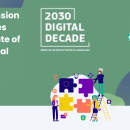State of the Digital Decade Package
In 2023, in a landmark step towards realising the objectives of the Digital Decade Policy Programme and the 2030 skills targets, the European Union launched the "State of the Digital Decade" package - a new and improved way of taking stock of progress against the benchmark of the digital transformation in Europe and its Member States. In effect, the package is a comprehensive, strategic roadmap to guide up- and re-skilling initiatives until 2030.
"State of the Digital Decade": for a resilient & competitive Europe
The report emphasizes the urgent need to accelerate and deepen collective efforts in policy, investment, and technology adoption. It identifies four key pillars crucial for a digitally sovereign, resilient, and competitive EU: digital skills, digital infrastructure, digitalization of businesses (including Artificial Intelligence), and digitalization of public services. Additionally, it underscores the monitoring of the European Declaration on Digital Rights and Principles, embodying the EU's commitment to a secure, safe, and sustainable digital transformation that puts people first.,
State of the Digital Decade 2023
The 2023 "State of the Digital Decade" report sets a 2030 target of universal gigabit coverage and performant 5G networks in populated areas to address an identified gap in fibre network availability and 5G coverage. Additional targets are set for enhancing the widespread adoption of cloud computing, big data, and AI. While the EU aspires to increase basic digital skills and ICT specialists, projections of the 2023 see Europe fall short of realising its ambitions on skills unless urgent action is prioritised. Member States must invest in quality education, skills development, and promote gender inclusivity in STEM fields.
State of the Digital Decade 2024
The report shows that significant work remains to be done to reach the 2030 targets on digital skills: only 55.6% of EU’s population have at least basic digital skills and, at the current pace, the number of ICT specialists will reach just 12 million by 2030 – well below the EUR 20 million target. Amid an aging population, and increasingly technology-driven society and growing competition for digitally skilled talent, the report calls for a more coherent and strategic framework of investment, governance, and capacity-building for effective and inclusive digital skills and talent development. In this context, the Commission also updated country-specific and cross-cutting recommendations for every EU Member State to address the identified gaps.
State of the Digital Decade 2025
The 2025 report takes stock of EU's progress towards a sustainable and human-centric digital transformation in Europe. The adoption of the National Digital Decade Strategic Roadmaps, represents a significant milestone, with EU Member States collectively committing to over 1,900 ICT-focused measures, pooling a total investment of EUR 288.6 billion, with most funding coming from public budgets (EUR 205.1 billion, or 1.14% of the EU’s GDP).
Following the 2024 State of the Digital Decade report recommendations, 21 Member States have updated their National Roadmaps and added roughly 20% of new measures to support the digital transformation of their society and economy. Other achievements highlighted in the report include:
- Strengthened digital infrastructure and technological capabilities throughout the EU's regions, through large-scale initiatives and investment like the Digital Europe Programme.
- The EU has acquired 8 supercomputers over the last 8 years (3 of those rank up in the world's top 10 fastest supercomputers, and also amongst the most green and energy efficient ones in the world).
- Similarly, 4 state-of-the art pilot semiconductor pilot lines have been launched to test and validate the market readiness of advanced chip technologies.
- Over 150 European Digital Innovation Hubs are currently operational across the EU, encompassing close to 90% of European regions, and providing key support to both public and private organisations, in particular SMEs.








